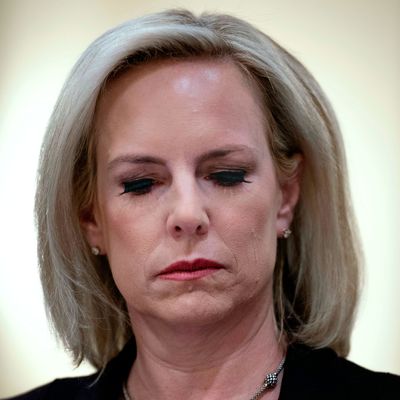
Intelligencer staffers Benjamin Hart, Jonathan Chait, and Eric Levitz discuss the political fallout from the high-profile firings at the Department of Homeland Security and elsewhere in the security apparatus.
Ben: Yesterday, Homeland Security director Kirstjen Nielsen resigned at President Trump’s request. Jon, you wrote that her refusal to break the law by clamping down on the border beyond judicial restraints is what ultimately led to her dismissal. Not to be naive about this, but won’t Trump run into the same problem with her replacement, Kevin McAleenan, or anyone who takes his place? Is Trump’s dissatisfaction more about posture than the execution of policy?
Jon: Yes, he probably will! My background assumption is that Trump is not a terribly smart person, and his actions often fail to advance a coherent long-term strategy. I know you love Trump, Ben, so I’m sorry to offend.
Ben: I needed to hear this.
Eric: Yeah, I don’t know. It is difficult to understand how Trump could believe that he can overcome legal constraints on his border enforcement options by simply replacing his DHS director. He can order McAleenan to reestablish family separation, but the judiciary would presumably still block it.
I do think a lot of Trump-era policy-making is for promotional use primarily — which is to say, that it’s designed to project a certain image to Fox News viewers more than to achieve an objective. In that sense, it’s possible that having a male DHS director say tough things about migrants into microphones will be more satisfactory for Trump than having a female one do so. (In other words, Nielsen might not resemble a DHS director “out of central casting.”)
Jon: Peripheral casting has talent, too. They get overlooked.
Eric: Haha.
Jon: I do think Trump is responsive to basic numbers about immigration, and he is apparently upset that his policy is failing. He does not grasp any of the constraints or the relation between policies and outcomes.
Eric: It’s also possible that the real agent here isn’t Trump but Stephen Miller.
Jon: Yeah, a deeper DHS purge seems more like a Miller play. Trump would not think below the top level of an agency.
Ben: That larger house cleaning includes the ouster of the head of the Secret Service and the looming dismissal of the U.S. Citizenship and Immigration Services director. They will presumably be replaced by “tough” people, in Trump’s parlance, though the latter position was already filled by a “tough” person.
CNN reports that Trump really did want to close parts of the U.S.-Mexico border last month — that it wasn’t just a bluff — that he wanted to institute an even more extreme version of his child-separation policy from last year, and that he told officials to simply not admit anymore migrants, an order they did not heed.
I also fear we’re about to be privy to the rollout of some draconian new policy we hadn’t even considered.
Jon: Literally just shuddered.
Eric: From what I understand, the Trump administration’s best play is to use development aid to bribe the Mexican government into doing their dirt for them at Mexico’s southern border (where American laws and public opinion are less of a constraint on what authorities can do to Central Americans headed north).
Ben: Trump won the 2016 election in large part by stirring up fears about immigration. But family separation is very unpopular, and his fearmongering didn’t work nearly as well in 2018 as it did two years before. It seems to me that making unusually harsh policies even harsher is not a brilliant play going into 2020, but hey, I didn’t think Trump would win last time. Do you think this is a political mistake?
Jon: Child separation was extremely unpopular — it lost more of his base than almost anything he’s done. On the other hand, running against his own immigration policy seems pretty unattractive, too. I’ve never understood how his “everything is still terrible” immigration message would translate to the campaign.
Eric: Then again, “The immigration problem is fixed now, so you should pay less attention to your anxieties about demographic change in the United States, and think more about your immediate material interests” isn’t a great message for the Trumpist GOP either.
Jon: Running against Democratic ideological excess is his best message.If the economy is good, he’ll say he can keep it going while Democrats have a bunch of crazy, expensive ideas. If the economy is in recession, he’s toast no matter what.
Eric: Yeah, I mostly agree. Though I think “Democrats support open borders” is among the most potent of the ideological excess arguments.
Ben: Regardless of the political wisdom, immigration enforcement seems to be a genuine obsession for Trump, to a degree I did not expect. You’d think he might lie and say the wall’s being built, declare that he has made it harder to come here both legally and illegally, focus on the booming economy, and call it a day. But no.
Eric: Yeah. Trump might be a nihilist in most respects, but he does seem to feel a deep, heartfelt disgust at the thought of non-rich brown people entering the U.S.





























